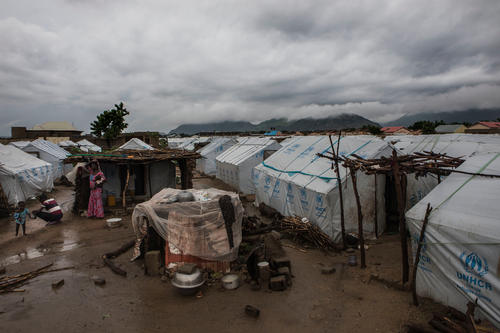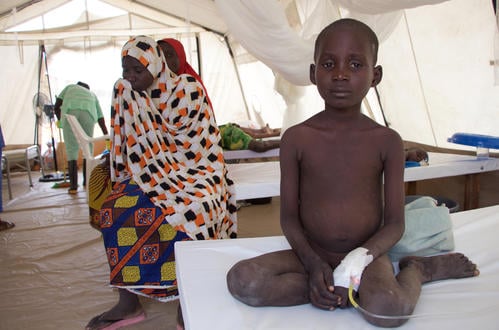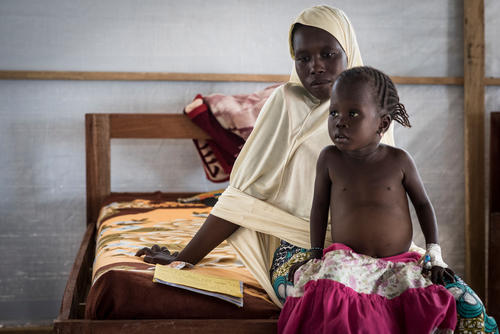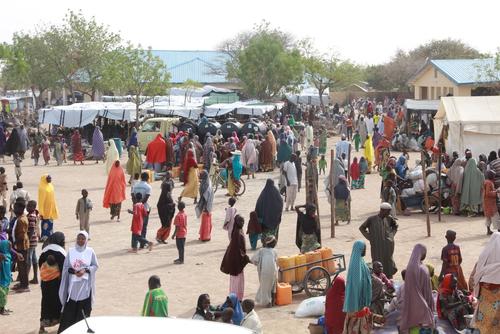The humanitarian consequences of the eight-year-long conflict between Boko Haram and the government of Nigeria are horrific. More than two million people have fled their homes, with little chance of returning in the near future. An unknown number of people are out of reach of any humanitarian assistance. Yet despite the scale of the suffering, many people are unaware of the extent of the conflict. MSF humanitarian advisor Heather Pagano, who spent the first part of 2017 in northeast Nigeria, explains what’s happening.

What is going on in northeast Nigeria?
What toll has the conflict taken on the people of northeast Nigeria?
The conflict between the Nigerian military and Boko Haram has been ongoing for eight years. It started in Borno state and spread across the northeast of Nigeria, spilling over into neighbouring countries; Cameroon, Chad and Niger.
More than two million people have fled their homes in northeast Nigeria. One million people sought refuge in Maiduguri, the capital of Borno State, doubling the size of the city.
Thousands have been killed in the fighting and many more by the deadly combination of malnutrition, measles and malaria. No one knows how many people have been killed for sure. Humanitarian organisations like MSF haven’t been able to work in areas held by Boko Haram, or those contested by the two sides.
Since 2015, the Nigerian military began reclaiming bigger towns in Borno and regrouping villagers from the surrounding areas inside. Others have come on their own in search of safety or basic services, like food, water and healthcare. These isolated towns are heavily militarised and people often have limited freedom to move outside, either for their safety or to prevent any potential collaboration with Boko Haram. Because they can’t go out to farm or fish, a huge number of these people rely almost entirely on humanitarian aid to survive.
What help is MSF providing in Borno State?
Today MSF is running operations in 11 towns in Borno State, treating malnourished children, providing medical care, distributing relief items, and providing water and sanitation services in camps for the displaced.
The extent of the crisis became clearer to the outside world last year. In June 2016, an MSF team managed to reach the town of Bama and found a ghost town, which had been almost entirely destroyed. Twenty four thousand people had been regrouped in the compound of an abandoned hospital, where they were living without access to food, water, shelter and medical care. Our teams found shocking rates of malnutrition; 39% of the children we screened had the disease in its most severe form, and 78 had to be immediately transferred to our hospital in Maiduguri.
As MSF teams reached other towns in Borno State, such as Ngala and Banki, they uncovered similarly acute alarming situations; extreme malnutrition and very limited access to food, water, shelter and medical care. Throughout the past year, MSF’s operations have expanded significantly to respond to this alarming situation.
Why are so many children malnourished?
The conflict destroyed farmland and infrastructure. Ordinary people were left with no choice, caught between attacks and kidnapping by Boko Haram on one side and Nigerian military counterinsurgency operations that forced them from their homes on the other. Military forces sought to cut off resources and funding to Boko Haram, who in turn raided villages for food and supplies. Due to the actions of both sides of the conflict, people could not go out to fish, farm or sell their goods in the market and they went hungry as a result.
We are also worried that children do not have sufficient access to advanced medical care. We think that many of the children who come to see us with malnutrition may first have had another sickness which they could not find treatment for, and which caused them to develop malnutrition.
Has the situation improved at all?
Since last year, UN agencies and aid organisations have arrived and scaled up in Maiduguri and some are now present in the heavily militarised towns outside of the capital, which can only be reached by helicopter or by road under armed escort. There is still a need for health care, water, sanitation services and shelter in many of these remote towns. Access to food has broadly improved, with the World Food Programme now feeding well over one million people every month.
But this is the case in areas where humanitarian organisations are able to go. What’s happening for people in the countryside and in areas under Boko Haram control is unknown. But people who have recently left these places tell us that there is little or no access to medical care and that they have left other people behind. We’re very concerned that people may be suffering out there whom we cannot reach.
What is most striking about this conflict?
First of all, it is the limited ability that people have to move freely outside of these isolated garrison towns. For instance, the town of Pulka is situated in front of a mountain and surrounded by a trench. People can leave for a few kilometres under military escort to collect firewood or do some limited farming, although this can be stopped by the Nigerian Army at any time due to insecurity. In others, such as Bama, the camp is entirely closed and people are entirely restricted from going outside.
Another striking element is that it is almost as if it is a war without wounded. In Borno, what’s unusual is that the ‘war-wounded’ we see are malnourished kids and people without healthcare. The majority of fighting takes place in the countryside or in places where outsiders are not allowed to go. In the main towns, instability remains worrying with suicide bombings that continue on a regular basis, often targeting displaced camps where people are extremely vulnerable.
Civilians have also been injured and killed by military operations. In January, more than 100 people were killed and at least 150 others were injured in an airstrike carried out by the Nigerian military on a camp for displaced people in Rann, where an MSF team was present.
Are people still being displaced from their homes in the region?
People continue to arrive at the main towns across Borno State, either on their own, in search of safety or basic services, or after military operations oblige them to leave, or attacks force them to flee. Upon arrival, people are screened by the military or village leaders to determine whether or not they are suspected of belonging to Boko Haram. The screening process can at times take a number of weeks to complete, and includes women and children, who have in the past been used by some Boko Haram members as suicide bombers.
In recent months, thousands of Nigerian refugees have returned, forcefully or voluntarily, from across the border in Cameroon, placing increased pressure on already overstretched resources. Food rations in Minawao camp in Cameroon were reduced and some people wanted to go home and begin farming and sustaining themselves again. But the reality they found upon their return was sadly different. When people arrived in Banki or were taken to Pulka in Nigeria, some found themselves equally reliant on humanitarian aid and that they could not go home to their original villages.
The displacement of so many people, with little likelihood of returning home anytime soon, risks becoming the new normal. Providing life-saving assistance to these people remains as important as ever.






